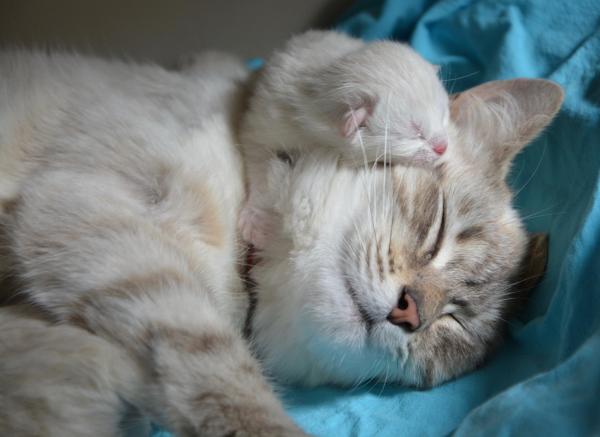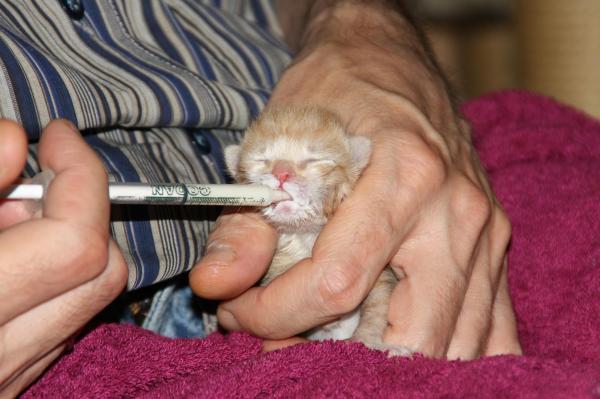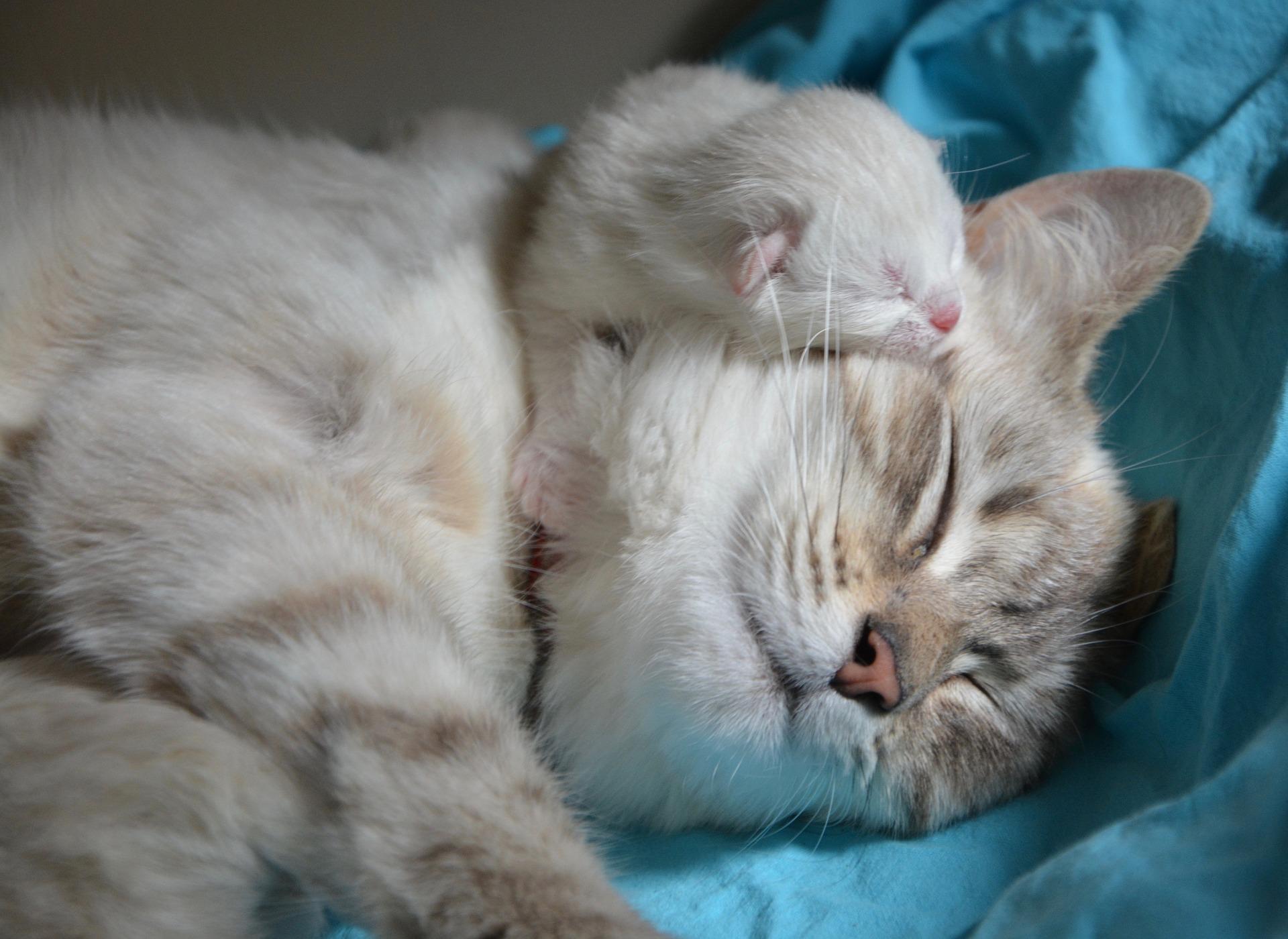Why Do Cats Eat Their Babies?



See files for Cats
An expectant litter of kittens can make any cat guardian nervous. The birth of new life can also be an emotional and joyful time. If you have been anxious about your beloved cat bringing new life into the world, you will likely have done all you can to make their first day a comfortable one. This is why seeing a mother cat eating one or more of her newborn kittens can be such a distressing sight. On rare occasions, it is also possible she may eat the entire litter. This event usually results in shock, frustration and even disgust.
Knowing the answer to ‘why do cats eat their babies?’ will help us know how to properly respond in this situation. Let AnimalWised explain more by providing the reasons why a mother would engage in this behavior.
Weak, sick or deformed kittens
When an animal consumes an animal of the same species, whether babies or adults, it is known as cannibalism. Understandably, the word elicits a strong reaction. If we apply this word to human behavior, then we might be disgusted. However, it is a mistake to apply the same human rationalizations and morals to the animal kingdom. Cannibalism is a relatively common occurrence in the animal kingdom.
Occasionally, one or more of a litter of newborn kittens will be born with a disease, deficiency, deformity or other health condition. It is possible this issue is one which is not perceptible to the naked human eye. A cat's olfactory sense are much more acute than ours, so they may be able to detect a problem we cannot. In these cases, the mother cat assumes the kitten is unable to survive until adulthood. For this reason, the cat will eat the kitten.
The reasons why a cat will eat a kitten they deem unable to survive has a lot to do with their natural instinct. Cats in the wild have a harder time than domestic cat rearing their young. They are more vulnerable to predators and the elements. Even the millennia of domestication does not mean companion cats do not retain some of this instinct.
In the wild, if a kitten does not survive the birth, their body can attracts predators. Their decomposition also provides a serious hygiene risk to the surviving litter. By consuming the weak kitten, the mother can is trying to provide a better chance of survival for the others. A cat will also eat her placenta and afterbirth to provide extra nutrients for milk production. Eating a weak or dead newborn kitten will act for the same purpose.
This process may seem cruel, but it is a behavior which has biological impulses important for the cat. However, there are other reasons a cat may eat her babies and we need to look out for them if they are in our care.

Stress
It is rare for a domestic cat to eat her babies due to stress, but this possibility should not be ruled out. If the environment during or after a cat's labor is stressful, then it can trigger nervous behavior in the mother cat. Environmental stressors may include constant foot traffic in the room, loud noises, over-manipulation of the cat or anything which might seem threatening.
The nervousness generated in the cat is not only for herself and her own safety, but also due to the fear of what could happen to her litter. She may be scared her kittens will be taken away from her or that the stressors make her babies more susceptible to predators. In some cases, the result could be the mother cat eating her babies due to stress. It may also occur if there are other animals around which she perceives as a threat, especially if she has not been socialized with them.
All of this is most common in first time mothers. This is because the stress is overtaking their natural instinct and leading them to make incorrect interpretations. For this reason, it is essential to offer an expectant feline mother the best care during pregnancy to provide a relaxed, calm and stress-free environment.
lack of maternal instinct
It is possible a mother cat will lack maternal instinct. She may not know what to do when her babies are born and will eat the kittens out of confusion. This is also unlikely and the reasons are not well-known. It is possible they were taken away from their own mother too soon or they have their own type of deficiency.
To prevent a mother eating her babies due to a lack of maternal instinct, we need to be vigilant after the kittens are born. We should monitor the cat's behavior. If you see the mother lacks any maternal instinct (e.g. they may not know to open the kitten's amniotic sac), then it puts the kittens' lives in serious jeopardy. If we see the cat ignoring the kittens or immediately trying to eat them without any attempt to nurture them, we may want to intervene. If you dom then you will need to take over caring for the kitten's needs. This includes feeding the newborn kittens.

Feline mastitis
Mastitis is an infection which is common only to mammals. This is because mastitis is an inflammation of the mammary glands and only mammals have them. There are various causes of mastitis in cats, but is potentially life threatening for the kittens. This is because an infection might pass from mother to baby and their vulnerable state means their immune system cannot handle it.
When the mother cat tries to breastfeed her babies, it can be very painful. This pain can cause the mother to reject her kittens or even consume them. If you suspect this may be the case with a cat in your care, you need to look out for the symptoms of mastitis in cats to know how to act. Usually, you will have to remove the kittens from the mother.
Mother cat does not recognize her young
It is possible the cat does not recognize her young. This can occur when the cat has birthed her babies via cesarean section. When this happens, many of the birth-related hormones which bond mother to kittens are not released. The result is that the mother does not recognize the kittens as her own and she eats them out of fear or confusion.
Similarly, in some cases of first-time mothers, the cat may confuse her offspring as prey instead of as her own babies. This is another reason we need to ensure we do not manipulate a cat's kittens too much. The smell of a human can stop mother from recognizing her kittens, although this would be relatively rare.

What to do if a cat eats her babies
The first thing to do if you see a cat eating her kittens is to stay calm. We know how shocking the scenario may be, but if we overreact we can make the situation worse. Even if it seems unnatural to us, this behavior has its reasons and we should not hold it against the cat.
Instead of rejecting the cat, we will need to try to find out why the cat ate her babies in the first place. You can base your interpretation on the reasons we have presented here, but you will need to take them to the veterinarian for an accurate diagnosis. It is possible the cat is unwell and has passed the illness to her kittens. Diagnosing the illness is the first step to treating the problem.
If any of the kittens in the litter survive or if they are healthy and you get to them before they are eaten, you should separate them from the mother. You will need to take over their care in terms of feeding, keeping safe and more. Eventually, you will need to wean them onto solid food. Speak to your veterinarian and they will provide some practical advice. You can look at our article on how to care for kittens to give you some help.
Similarly, if the cat has eaten her babies, it is very important you have the cat sterilized. We will need to prevent this from happening again. Also, sterilization has general benefits for the cat and for the larger feline community.
If you need some more background on how to care for a kitten the following video may help:

This article is purely informative. AnimalWised does not have the authority to prescribe any veterinary treatment or create a diagnosis. We invite you to take your pet to the veterinarian if they are suffering from any condition or pain.
If you want to read similar articles to Why Do Cats Eat Their Babies?, we recommend you visit our Pregnancy problems category.








